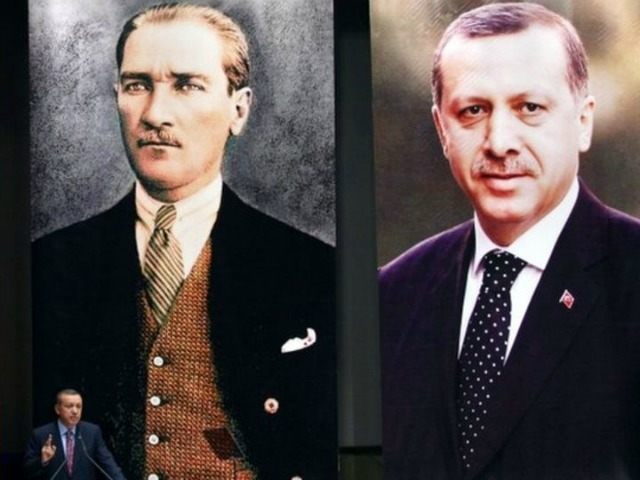Seventy-seven years ago today, the founder of the independent Republic of Turkey, Mustafa Kemal Ataturk, died in his bedroom at the Dolmabahce Palace in Istanbul.
Ataturk is still considered a national treasure, having resurrected Turkey from among the ashes of the Ottoman Empire in the aftermath of World War I. His ghost must have shuddered, however, upon hearing the cry of “Allahu Akbar” from among AKP members celebrating their party’s national election win on November 1.
Ataturk served in the military during the last days of the Ottoman Empire. Having lost almost all their territory in Europe and Africa when World War I broke out, the Ottomans sealed their fate by opting to fight on the side of Germany.
Ataturk gained fame during the war for defending Istanbul against invading British and French forces during a year-long Gallipoli Peninsula campaign. However, the Turks paid a heavy price for fighting on the losing side as the peace treaty forced upon them by the victors stripped the Empire of all Arab provinces, established an independent Armenia and autonomous Kurdistan, with Western Allied forces occupying and retaining economic control over the remainder of the country.
With the Ottoman Empire in ruin, Ataturk’s call for an independent Turkey and an end to foreign occupation was well received by all but the last Ottoman sultan seeking to retain power. Establishing himself in Ankara, war hero Ataturk became a catalyst for change and independence.
Armed by Russia, Ataturk either drove out or threatened to drive out all foreign occupiers in the country—including the sultan.
Ataturk now forced the Western allies to sign a new peace treaty in July 1923 that recognized an independent Turkish state. Three months later, he was elected its first president by the Grand National Assembly—an office he held until his death in 1938.
Interestingly, although Turkey was almost homogeneously Muslim, Ataturk recognized the path to a promising future for the country turned on casting off the restraining yoke of Islam in favor of secularism and westernization. For the next 15 years, he led the fight to minimize Islamic influence. Westernization, in turn, brought prosperity and a better quality of life.
Today, however, Turkey’s Recep Tayyip Erdogan has been using his political clout, both as prime minister and now as president, to reverse the country’s direction. He seeks to undo the miracle Ataturk created in Turkey, returning it to its old Islamic ways. Clearly, Erdogan hopes this re-direction will eventually place him in the seat of power abandoned by the last Ottoman sultan.
Just as Ataturk was a catalyst in Turkey’s independence movement, Erdogan has proven to be a catalyst in its Islamist movement.
As a member of an Islamist party, he was elected Mayor of Istanbul, serving from 1994-1998. He spent several months in jail after leaving office for publicly reading a poem of religious intolerance that claimed of Islam, “The mosques are our barracks, the domes our helmets, the minarets our bayonets and the faithful our soldiers.”
Three years later, Erdogan founded the Justice and Development Party (AKP), leading it to general election victories in 2002, 2007 and 2011. He was elected prime minister in 2003 and president in 2014.
To help pave Turkey’s retrograde into Islamism, Erdogan had to remove a major roadblock to doing so: the military. Ever since the days of Ataturk, the military has served as guardian of the country’s constitution. Between 1960 and 1997, it intervened four times to keep the civilian government walking the straight and narrow constitutional path.
The 21st century has witnessed the military’s removal from its guardianship role as it suffers the Erdogan factor—i.e., as Erdogan’s influence in government increased, the military’s decreased.
With the military out of the political loop, Erdogan next sought to increase the pace of the country’s retrograde into Islamism by removing constitutional roadblocks. This necessitated the AKP propelling its simple parliamentary majority into a super-majority. But the June 7, 2015 election to do that backfired on Erdogan—not only failing to gain a super-majority but losing its majority position.
As this put AKP in the embarrassing position of having to establish a coalition, Erdogan sought another option. After failing to establish a coalition government by the given deadline, Erdogan announced on August 24 a new election would be held November 1.
The bad news for AKP on November 1 was that it still failed to win a super-majority; the good news was it re-established its simple majority. Questions abound, however, as to the fairness of the five month campaign that denied opponents equal access to media sources.
As Erdogan continues to undermine Turkish democracy, we will know when he is confident he is well on his way to achieving this goal. Today, Ataturk remains so revered for his secularization and westernization successes that insulting his memory is a criminal act. We will recognize Erdogan’s confidence that Turkey is well on the path to Islamism when maligning Ataturk’s memory is no longer tantamount to maligning Erdogan himself.
Lt. Colonel James G. Zumwalt, USMC (Ret.), is a retired Marine infantry officer who served in the Vietnam war, the U.S. invasion of Panama and the first Gulf war. He is the author of “Bare Feet, Iron Will–Stories from the Other Side of Vietnam’s Battlefields,” “Living the Juche Lie: North Korea’s Kim Dynasty” and “Doomsday: Iran–The Clock is Ticking.” He frequently writes on foreign policy and defense issues.

COMMENTS
Please let us know if you're having issues with commenting.